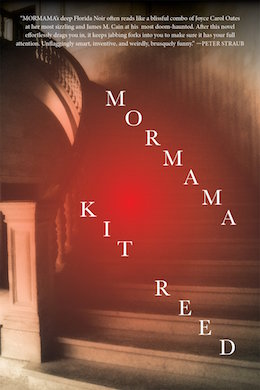When Dell Duval wakes, he has no idea who he is. He has no ID, no memories, only a note with a Jacksonville address and a flash drive of unknown contents. After a brief stint living on the streets and researching the house on May Street in Jacksonville, Florida, he moves into the basement and makes tentative contact with its occupants. Living in the old Victorian are Lane and her son Theo and their three ancient widowed, dictatorial aunts. Lane sees the house as a temporary refuge after her husband absconds with all her money. Theo is bored, lonely, and angry at everyone. The aunts want Lane and Theo to stay in the house forever, and react unpleasantly when they refuse.
As Theo soon discovers, there is something evil about the Ellis House. It’s haunted by the ghost of a woman known as “Mormama;” almost every night she comes to Theo’s bedside and whispers about the horrors that have taken place in the house since it was built by its domineering, cruel original owner. Over and over again, men and boys suffer terrible fates inside the walls of the Ellis House. Dell starts to dig into the house’s secret, and despite Mormama’s warnings, uncovers the worst thing imaginable.
Let’s start off with the pros. Mormama has a compelling premise with many thrilling, haunting elements. Reed is an evocative writer. Her novel is dramatic, suspenseful, and melancholy, and written with diligent craft. It’s not nearly as scary as I would prefer a haunted house story to be, nor does the premise pay off in a satisfactory way. But overall it’s a solidly written tale. That being said, the novel suffers from some pretty major stumbling blocks.
Unfortunately for me, the actual contents of Mormama did not live up to the high expectations set by the description on the book’s back cover. I signed up to read the book blurbed as “completely convincing, and scary in all sorts of ways” and “one of the best predatory house tales I’ve come across in many years.” What I got was…not that. Or, more accurately, a novel that could have been that but was undermined by its flaws. The description made it sound like Mormama was a Southern version of Shirley Jackson’s terrifying The Haunting of Hill House, and Reed’s novel doesn’t reach those heights.
I hate to break out that “unfortunately” again, because while I’m sure Reed is a fantastic writer – after all, she’s been writing since 1958 and has been nominated for awards from Hugo, Locus, Tiptree, World Fantasy, Shirley Jackson, and more – that talent wasn’t on full display here.
The biggest flaw is the novel’s narrative structure. Having multiple characters recount an event from different perspectives is a classic trick, but one that either works great or fails miserably. The best recent example of this narrative device is Chan-wook Park’s phenomenal, devastating movie The Handmaiden (if you haven’t seen it yet, OH. MY. GOD.) When characters recount their own version of an event, the result should alter the reader’s perspective and tease new secrets. With Mormama, events are simply retold. Sometimes new information is revealed, but rarely does it cause a seismic shift in understanding. Not even Mormama herself added much to the proceedings. Ultimately, I’m not sure what the point of the multiple POVs was, other than to pad out the story.
The constant jumping around between perspectives felt disjointed and jarring rather than enlightening. And if you don’t like certain characters, spending a lot of time in their heads can be exhausting. The only character I found particularly enjoyable (not necessarily likeable, but at least interesting enough) was Dell, ostensibly the main protagonist. The rest did little for me except make me flip ahead to see how many more pages of their chapter was left.
Mormama probably would’ve been a lot stronger as a novella. As a full-length novel, the story is overstuffed with empty calories, both in terms of subplots and characters. The clutter cut into the gothic horror and diluted the suspense. I could’ve done without the multiple narrators as well, or at the most just Dell and Theo. Chapters from the perspective of the rest of the characters felt more like filler to stretch a small, self-contained story out to nearly 300 pages. A bunch of stuff happens to a bunch of people and then the book ends, abruptly and without much sense of resolution or explanation. There’s a kernel of a good haunted mansion tale here, but it’s buried under repetition and superfluous extras.
The novel is basically a collection of somewhat sinister scenarios, a metric ton of telling not showing, and a plot that doesn’t quite reach the heights promised by its premise. Between Reed’s many other highly regarded works and Mormama, I don’t know what happened. Maybe it’s the disconnect between the description and the text that’s throwing me off. Maybe the book is as wonky as I thought it was. Really, it’s probably a little of both.
Outside the problems detailed above, it was neither the best nor the worst book I’ve ever read. If nothing else, I can now cross “read something by award-winning Kit Reed” off of my to-do list. Her writing style didn’t quite work for me personally, but there’s nothing inherently “bad” about it. I can appreciate the craft even if it doesn’t click with me, but where I get fussy is when the plot doesn’t live up to its full potential. With its squandered premise, constant jolting about between characters, and choppy dialogue, Mormama misses the mark.
Mormama is available now from Tor Books.
Alex Brown is a teen librarian, writer, geeknerdloserweirdo, and all-around pop culture obsessive who watches entirely too much TV. Keep up with her every move on Twitter and Instagram, or get lost in the rabbit warren of ships and fandoms on her Tumblr.










